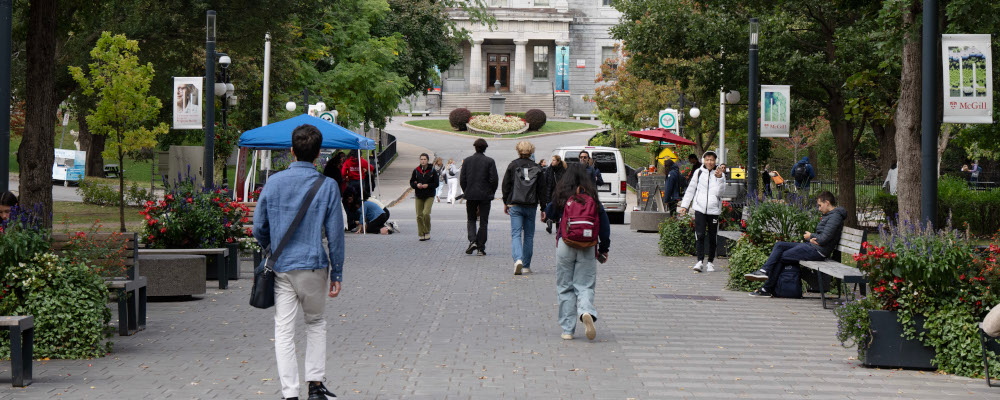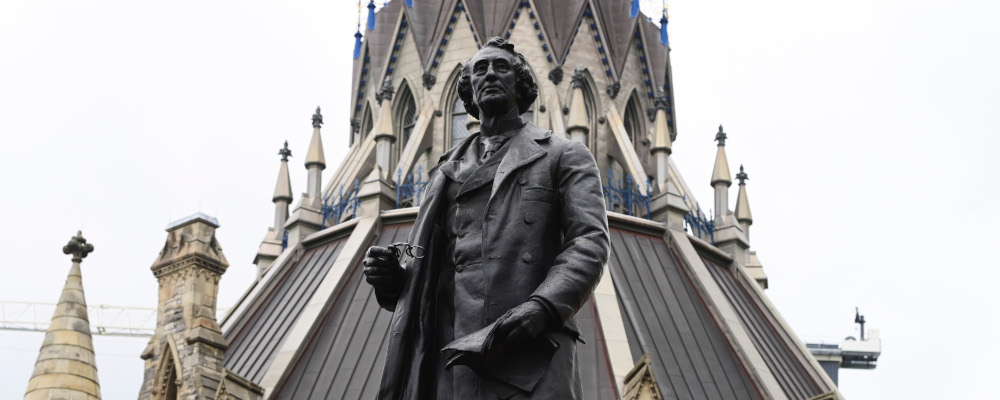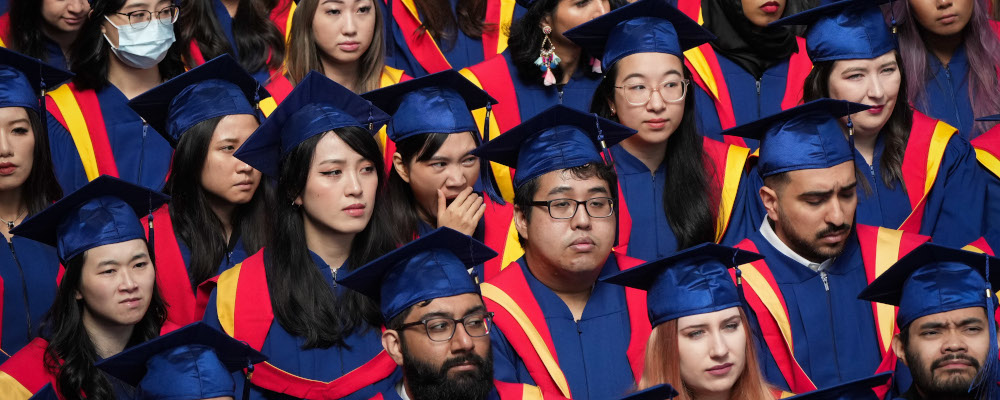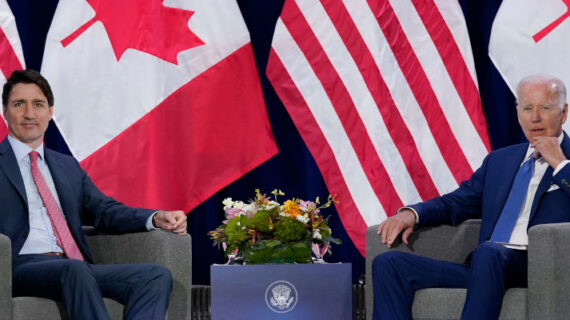Recent events indicate that universities in Canada and the United States are in a worrisome state. Symptoms of academic rot include disturbing instances of antisemitism and tepid or even non-existent efforts by administrators to condemn them, attacks on students and faculty, and a litany of examples of canceling and prohibiting far less serious forms of expression. However, there is a way to renew higher education in Canada: by recollecting what university education can and always has been.
There have been numerous proposals and attempts to reform universities, ranging from the implementation of free-speech codes to cutting public funding, whose effectiveness is questionable. Canadians are becoming increasingly skeptical about the value of a university education. Enrolments among domestic students are decreasing while universities rely increasingly upon foreign students who pay higher tuition, but with that reliance comes considerable risk.
University administrators tend to dismiss public skepticism as a form of populist anti-intellectualism, but their naïve perspective overlooks the fact that over the past generation, and especially the past decade, universities have become both more ideologically homogenous and even more left-wing, and therefore more hostile to mainstream opinions. In a time when universities have amplified equity, diversity, and inclusion efforts, they have neglected and even resisted promoting intellectual diversity, with the result that now faculty and graduate students are less tolerant of open inquiry, and the youth more open to authoritarianism over liberal democracy.

Universities have historically been institutions that drew upon widespread public support on account of the benefits they provide society, including educating the young, promoting economic growth, and prestige. But the public is now more likely to view universities as miseducating the young and failing to produce economic benefit, both of which yield little prestige. Greg Conti of Princeton University makes an observation of American universities that can be applied to Canadian ones: they risk becoming “sectarian,” not in the original sense of being religious institutions, but in the current sense of appealing to an increasingly monochrome “woke” elite with the same progressivist beliefs and viewpoints. Canadian universities, like their American counterparts, need to make a better case that they serve the public good. Universities that stifle intellectual diversity cannot serve their students who will need to navigate life in a pluralistic society and economy.
A budding renaissance for universities
Despite these widespread problems with universities, Canadians have overlooked that in certain places in the U.S. universities are undergoing a renaissance that can serve as a model for restoring public trust in higher education. Flagship public universities in several states have established schools of civic thought and leadership to address the ideological conformity that characterizes most universities, and the polarization that marks their political life.
This process started in 2016 when the then-Republican governor of Arizona earmarked $5 million per year for an initiative that is the School of Civic and Economic Thought and Leadership (SCETL) at Arizona State University, which is home to about 75,000 students. Its success and continued bipartisan support has inspired similar initiatives at other flagship public universities including the University of Texas-Austin, Ohio State, University of Florida, Florida State, University of North Carolina, Utah, and elsewhere. These programs offer their own degree majors, minors, and certificates, and have grown and are now so successful that it has now become a challenge for them to hire enough qualified faculty to teach.
The aim of these new schools of civic and economic leadership is, in the words of the mission statement of SCETL, to “blend transdisciplinary study of the liberal arts and classic texts with examination of American ideas, institutions, and civic culture; experiential learning in leadership and civic affairs; and the practice of civil discourse.” They aim not to bring in more politics and greater contention from outside the university, but rather to raise the level of debate and civility by addressing some of the deeper questions that we confront both as human beings and as citizens.
As the director of the Civitas Institute at the University of Texas-Austin observes of the mission of these schools: “Although it is not a value-free social science, neither is it partisan. If anything, it is pre-partisan. Before we can develop a reasonable outlook on the policy issues of the day, we must first acquire knowledge of the character and basis of the political institutions we have inherited and must now steward as Americans.” These schools provide civic education within the broader matrix of liberal education.
The vision of these schools is delivered in three primary modes: 1) undergraduate curriculum; 2) public outreach that includes speakers and debates that exhibit how civil discourse is maintained despite political differences; and 3) developing K-12 civics curriculum to address the civic literacy crisis in America. Classes are taught primarily by faculty broadly trained in the great traditions of Western liberal education (while also looking beyond them). They are passionate about teaching instead of being specialists concerned with chasing down their next research grant, which means they are held more accountable to the well-being and success of their students than research faculty typically are.

To focus on one aspect of their mission, the undergraduate curriculum concentrates on four main areas of study: 1) political and ethical ideas and theory that cultivate understanding of what makes for a good political community; 2) economic thought which cultivates understanding of the moral foundations the economy and what economic systems benefit one’s country; 3) political history that cultivates understanding of the origins and background of some of the great debates and issues of their country; 4) leadership which cultivates an understanding and moral responsibility of the use of power and authority. These institutions aim to cultivate understanding of the subjects they teach but they also cultivate a sense of moral responsibility among their students towards one another and towards the communities they will eventually serve.
These schools of civic thought and leadership fill a void in university education because the traditional disciplines, including political science, economics, philosophy, and history, have largely neglected civic education, as demonstrated by the appallingly low rates of civic literacy in the U.S. and in Canada. These low rates play a part in the poor state of liberal democracy these days. This crisis has been noticed by a wide range of observers ranging from the Globe and Mail editorial board to Alberta Premier Smith, who last June acknowledged the severity of this crisis in response to the auditor general’s recommendation that MLAs take a class on Canadian civics.
Knowing who one’s premier is, or (better) whether education is a provincial or federal concern, is important. But these institutions do more than simply impart factual knowledge about our laws, institutions, or history. They also cultivate intellectual and moral habits of civility and deliberation that democratic citizenship requires and that are lacking in our politically polarized age. They do this primarily by conducting small Socratic seminar classes where students discuss assigned texts that include the U.S. Constitution, founding documents including the Federalist Papers, classic commentaries and critiques of the American regime such as Frederick Douglass, Alexis de Tocqueville, and Abraham Lincoln, as well as key writings in political and economic thought that are the cornerstone of a liberal education that goes beyond civic education, including those by Plato, Aristotle, Adam Smith, Shakespeare, Jane Austen, and more. The curriculum is supplemented by a program of public events that feature noteworthy speakers and debates that model civil debate and discourse.
By learning to think together in seminars, students learn the habits of intellectual humility and civility that come from engaging and even befriending persons with ideas and interpretations very different from their own. Learning in seminars is active and interpersonal. Students do not sit (or sleep) passively in crowded lecture halls where the professor will never know their names. These institutions constitute a renaissance in higher education because they also revive interpersonal learning and teaching at a time when universities have become so depersonalized. The skills and habits learned by the students in these rigorous programs prepare them for the life of citizenship and leadership and equip them to be full participants in the economy as well.
A school of civic and economic leadership for Alberta
These schools for civic and economic leadership have been developed to serve the American public, but with some imagination, their vision can be fruitfully adapted in Canada, and Alberta in particular. Alberta has a strong tradition of innovation in education, including civic education, and there is no reason why this creativity cannot be applied to higher education.
If we consider the four main subjects on which these schools focus—political ideas and theory, economic thought, history, and leadership—we can see how easily this model can be adapted to Canada and Alberta. Like the U.S., Canada is a liberal democracy based on the English common law model. Our own founders were influenced by many of the same liberal ideas, including John Locke and even James Madison. However, few Canadians appreciate the depth of the ideas that the Fathers of Confederation considered because, unlike the debates of the American founders, the publication of the debates over the Quebec resolutions has been woefully inadequate, which has contributed to the deficit in our civic literacy.
Canadians have some familiarity with some of their founders including John A. Macdonald because of public controversies over statues, but how many Canadians are familiar with figures and ideas that informed our founding ideals of responsible government, including Jean-Louis de Lolme, Lord Durham, Robert Baldwin, Louis-Hypolite Lafontaine, Walter Bagehot, Thomas D’Arcy McGee, Alpheus Todd, and John George Bourinot, not to mention the controversial issues our founders debated and that continue to challenge the politics of our country?
A school of civic and economic leadership that brings together scholars and students who focus broadly on Canada’s founding ideas of responsible government and parliamentarism, and studying them in light of the broader traditions of liberal education, would enable students to deepen awareness of the type of regime in which they live and hope to flourish in for the remainder of their lives. Studying how the Fathers of Confederation dealt with fundamental questions of liberty and equality, responsibility, deliberation, representation, conditions for responsible government, centralization versus decentralization, economic union and freedom, and executive and legislative power, could inform our contemporary debates and show how today’s concerns are rooted in, and in many cases reiterations of, the questions the framers of our laws faced.

Of course, the study of Canada’s founding would be incomplete without developing an awareness of why our founders regarded Rupert’s Land (as it was known then) as their colony, as London regarded British North America as theirs. We know the results of that imperial vision, including the fraught conditions of Indigenous Peoples in our history and the ongoing problems that Alberta has with the central government. An Alberta school of civic and economic leadership would not shy away from these questions. It would also be well-equipped to consider Canada’s experiment of responsible government and empire considering historical precedents including that of Great Britain, Rome, Athens, and others.
The curriculum, including history courses, would cultivate a certain amount of pride in Canadian history without shrinking from seeing our faults. Controversies surrounding Canada’s political leaders, including John A. Macdonald, make the study of leadership especially crucial at this time. In addition to Canada’s leaders, this school would also include in its curriculum the study of the great leaders of the past, including Lincoln, Churchill, Mandela, Gandhi, and others.
A school to promote responsible citizens
An American commentator recently noted its history is full of failures and hypocrisies in realizing the American Dream. But he would gladly be called a failure and hypocrite because the dream is worthy of achievement. Better to fail at achieving the dream than to give up on that dream, which is the danger that we currently face as Canadians and Albertans. A school of civic thought and leadership would cultivate a similar attitude towards Canada’s founding ideals, and its unique mission would consist of prioritizing the understanding of those founding ideals and the deeper questions that liberal education asks concerning the just, noble, and advantageous for human beings and citizens.
Canadians are right to be proud of their country—and also worried. A school of civic and economic leadership would help them understand their country and prepare them for the challenges of improving it. With good reason, we are proud that our country is a magnet for immigrants and has been since its founding. There are good reasons for them to think Canada’s political freedoms and economic opportunities can provide them with a good life. Despite a fraught history of relations, Indigenous Canadians also appreciate what Canada can offer. The growing number of Indigenous students attending Canadian universities would also find the mission and curriculum of the school I am proposing beneficial.
Canada is currently under attack from many sides. From the Left, the “woke” regard Canada as illegitimate, with some even going so far as to call our country, “so-called Canada.” From the Right one finds Alberta separatists. More ominously, federal and provincial governments seem willing to ignore the Constitution. From all angles, Canadians are being told that Canada and its founding ideals of liberal democracy are not worthwhile. The sense of civic responsibility among Canadians and Albertans needs to be revived.
A school of civic and economic leadership, steeped within the great traditions of Western liberal education (but also looking beyond them), would benefit all Canadians by promoting civic responsibility and therefore promoting public trust in our universities. It would reinvigorate the study of Canada’s liberal democratic ideals with a curriculum that universities currently do not do a very good job of providing.
It would also promote a sense of responsibility among its students that we as citizens are responsible towards one another and for the wise curation and guardianship of those liberal democratic ideals. Alberta has a well-earned reputation for being Canada’s incubator for innovation in education. A school of civic and economic leadership in one or more of Alberta’s great universities can enhance that reputation, for the benefit of all Albertans and Canadians.




